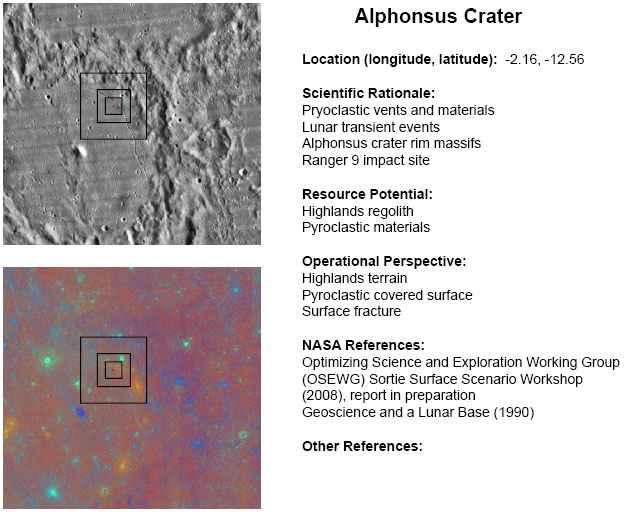RoI - Alphonsus Crater
Contents
Alphonsus Crater
(Tier 1 Region of Interest for Constellation Program)
Official NASA Overview

source: NASA Cx-LROC Tier 1 Targets (PDF); see expanded details below
Scientific Rationale
Pyroclastic vents and materials
The edges of the floor of Alphonsus contain concentric rilles with 11 small dark halo craters at various places along their lengths. The craters are the low-rimed lunar equivalents of cinder cone craters and the surrounding dark annulus (areas = 8 to 79 km^2) is pyroclastics (ash) ejected from the craters. Alphonsus is a floor-fractured crater, one that has been invaded by magma that ponds under the crater often lifting the floor and explosively escaping to form dark halo craters. The rilles are probably surface manifestations of dikes where magma rose to the surface through fractures.
- Coombs, C. R. & 3 others (1990). Pyroclastic Volcanism in the Alphonsus Region. Proc. 20th Lunar Planet. Sci. Conf., 161-174.
- Doel, R. E. (1996). The Lunar Volcanism Controversy. Sky & Telescope (October) 26-30.
- Gaddis, L. (1999) Lunar Pyroclastic Volcanism Project.
- Head, J. W. & L. Wilson (1979). Alphonsus-type dark-halo craters: Morphology, morphometry and eruption conditions. Proc. Lunar Planet. Sci. Conf. 10th, 2861-2897.
- Wood, C. A. Mar. 2001. Alphonsus: volcanism then and now? Sky & Telescope March 2001 v101 p116
- NASA SP-362, Apollo over the Moon; A View from Orbit, Chapter 6: Rimae (Part 3: Straight Rimae), Figures 211, 212, 213, 214, 215, and 216.
Lunar Transient Events
LTE (or more commonly Lunar Transient Phenomena - LTP) are reported changes in the normal appear of a feature, typically hazes, brightening or flashes. Virtually all have been reported by amateurs and are not confirmed as representing anomalous activity on the Moon. The main evidence for their possible reality is (a) some sites, such as Alphonsus, are repeatedly cited as hosting LTP (however, nearly all LTP sites are famous craters that are commonly observed); and (b) sensors of Apollo and other spacecraft have reported very rare detections of outgassing of Argon and other rare gases. It is unknown if outgassing causes LTPs.
Alphonsus (overall, not just this Region of Interest) has the 4th largest number of LTP sightings.
- Add details of Alphonsus TLP.
Alphonsus Crater Rim Massifs
Alphonsus was formed before the Imbrium Basin.
Ranger 9 Impact Site
The artificial impact-craterlet created by Ranger 9 (on the floor of Alphonsus) is described and depicted in NASA SP-362, Apollo over the Moon; A View from Orbit, Chapter 5: Craters (Part 2), Figure 123.
Additional Information
LROC Links
- Featured Image -- Alphonsus crater mantled floor fracture
LPOD Articles
A Long Line in a Clutter of Magnificence. Just Another Glorious Image Craters and Papers Micro-Topo Volcanic Craters on the Moon The Golden Triad New Observations of a Well-Known Area
General Bibliography
- Coombs, C. R. & 4 others (1990). The Alphonsus region: A geologic and remote-sensing perspective. Proc. 20th Lunar Planet. Sci. Conf., 161-174.